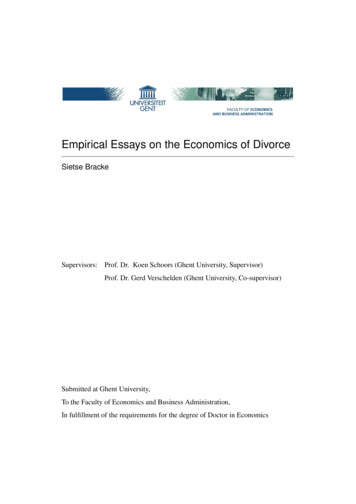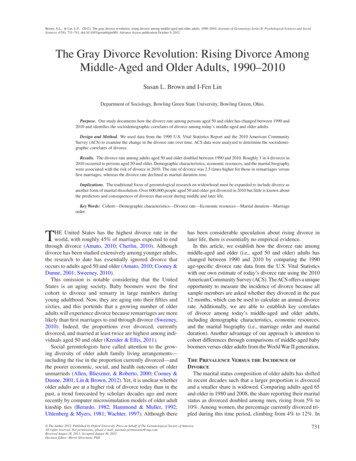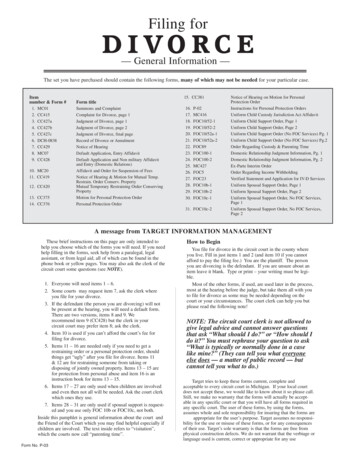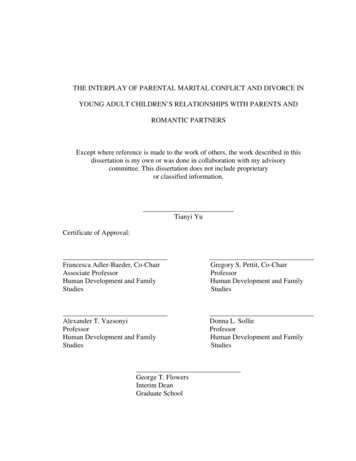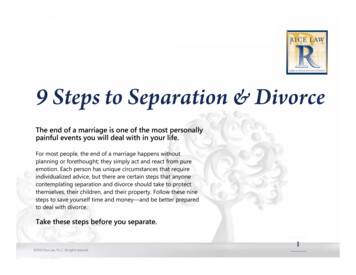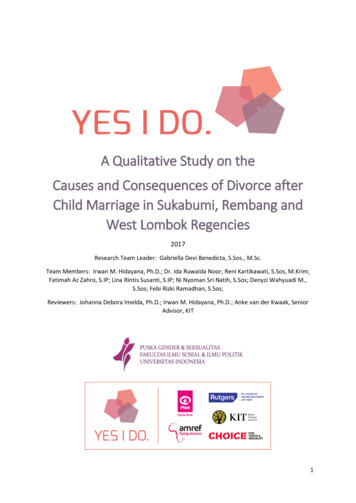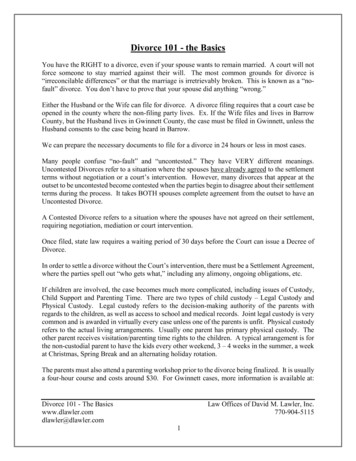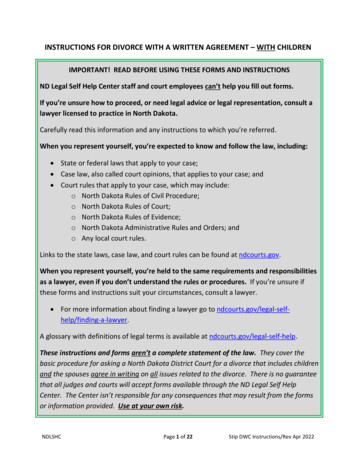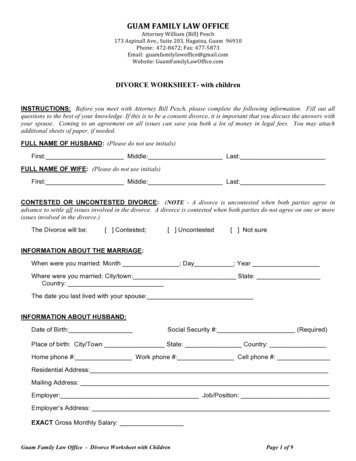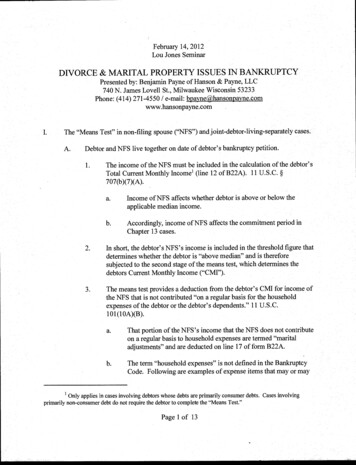
Transcription
February 14, 2012Lou Jones SeminarDIVORCE & MARITAL PROPERTY ISSUES IN BANKRUPTCYPresented by: Benjamin Payne of Hanson & Payne, LLC740 N. James Lovell St., Milwaukee Wisconsin 53233Phone: (414) 271-4550 / e-mail: bpayne@hansonpayne.comwww.hansonpayne.comThe "Means Test" in non-filing spouse ("NFS") and joint-debtor-living-separately cases.A.Debtor and NFS live together on date of debtor's bankruptcy petition.1.The income of the NFS must be included in the calculation of the debtor'sTotal Current Monthly Income' (line 12 of B22A). 11 U.S.C. §707(b)(7)(A) a.Income of NFS affects whether debtor is above or below theapplicable median income.Accordingly, income of NFS affects the commitment period inChapter 13 cases.2.In short, the debtor's NFS's income is included in the threshold figure thatdetermines whether the debtor is "above median" and is thereforesubjected to the second stage of the means test, which determines thedebtors Current Monthly Income ("CMI").3.The means test provides a deduction from the debtor's CMI for income ofthe NFS that is not contributed "on a regular basis for the householdexpenses of the debtor or the debtor's dependents." 11 U.S.C.101(10A)(B).a.That portion of the NFS's income that the NFS does not contributeon a regular basis to household expenses are termed "maritaladjustments" and are deducted on line 17 of form B22A.The term "household expenses" is not defined in the BankruptcyCode. Following are examples of expense items that may or may1 Only applies in cases involving debtors whose debts are primarily consumer debts. Cases involvingprimarily non-consumer debt do not require the debtor to complete the "Means Test."Page 1 of 13
not constitute "household expenses" for the purposes of computingCMI.(1)NFS pays tuition for a child that is a dependent of thedebtor;(2)NFS pays tuition for a child that is not a dependent of thedebtor (ex. NFS's adult child from a previous relationship);(3)NFS's contributions to his/her retirement plan(s);(4)NFS's contributions to maintain rental property jointlyowned with debtor;(5)NFS's contributions to NFS's business venture(s);(a)See In Re Boatright, 414 B.R. 526 (Bankr. W.D.Mo. 2009). [Debtor's annual income was 30,000and income of her NFS was 180,000. NFShistorically paid mortgage payment and utilities anddebtor paid all other household expenses. NFSspent considerable amount of his income on abusiness venture to develop and promote amusician; a business venture that had operated at aloss since its inception. Debtor claimed maritaladjustment for all of NFS's income except theamounts contributed by NFS to mortgage andutilities. Court overruled trustee's motion todismiss for abuse, holding that the debtor passed themathematical means test.](6)NFS's country club / athletic club membership;(7)NFS's payments on life insurance premiums;(8)NFS's expenses for treating a medical condition of the NFSor of a child or elderly parent who is not a dependent of thedebtor;(9)Mortgage payment on primary residence owned solely byNFS;Marital adjustment allowed - Sturm, supra;Page 2 of 13
In re Shahan, 367 B.R. 732 (Bankr. D. Kan.2007).Marital adjustment not allowed - In reTrimarchi, 421 B.R. 914 (Banks. N.D. Ill.2010); In re Vollen, 426 B.R. 359 (Bankr.D. Kan. 2010).(10) Note: regardless of which way the court rules on allowanceof the marital adjustment in CMI, the court may find thecase an abuse under the "totality of the circumstances,"under 707(b)(3). See In re Kulakowski, 2011 Banks.LEXIS 3284 (Bankr. M.D. Fla. 2011).c.A logical means of determining the extent to which the NFScontributes income to the household expenses of the debtor and thedebtor's dependents is to first determine the extent of the debtor'sand the debtor's dependent's monthly household expenses.Subtract from that figure the portion the debtor contributes to thatmonthly expense and the balance is the maximum amount the NFScould contribute to the household expenses of the debtor and thedebtor's dependents, therefore the maximum amount of NFS'sincome included in CMI.Trustee bears the burden of proving how much, if any, of theNFS's income must be included in CMI. In re Roll, 400 B.R. 674(Bankr. W.D. Wis. 2008); Sturm v. U.S. Trustee, 455 B.R. 130(N.D. Ohio 2011).Joint debtors are living separately on date of bankruptcy petition (typical inimminent and early-stage divorce situations).The income of both spouses must be included in the calculation of thedebtors' Total Current Monthly Income (line 12 of I322A). 11 U.S.C. §707(b)(7)(A).2.Above-median joint debtors living separately are not allowed a "maritaladjustment" from CMI because the marital deduction from CMI is onlyallowed when the income sought to be excluded is attributable to a nondebtor.3.Joint debtors living separately are required to complete a single, jointmeans test. Harman v. Fink, 435 B.R. 596 (8th Cir BAP. 2010).Page 3 of 13
4.Joint debtors living separately likely have much higher actual expensesthan those allowed as deductions in the means test because the means testdoes not allow each debtor to claim the IRS National Standard expensesfor health care, housing and utilities, transportation, etc.5.In re Crego, 387 B.R. 225 (Bankr. E.D. Wis. 2008) (Judge Kelley), standsfor the proposition that joint debtors living separately may be permitted toclaim some of the duplicate expenses of living apart as a "specialcircumstance," if the evidence supports the additional expenses and ifthere is no reasonable alternative to the debtors living separately.a.In addition to claiming the additional expenses of living separatelyas a special circumstance in the means test, the debtors in Cregodemonstrated their additional expenses by filing affidavits.b.Court in Crego did not give a blank check to joint debtors livingseparately who want to claim additional expenses as a specialcircumstance.(1)Debtors must have no reasonable alternative to livingseparately;(2)Expenses claimed as special circumstance must bereasonable;(a)To determine reasonable rent expense, Judge Kelleycompared joint debtor's rent to National Standardand Local Milwaukee Standards for a householdsize of one and found that debtors should be limitedto an additional rent expense not greater than the 1,610.00 National and Local Standards allowance.Effect of marital property agreements and divorce agreements/decrees in bankruptcy.Property Classification Agreements in Bankruptcy:1.Wisconsin property classification agreements ("PCAs")are governedprimarily by Wis. Stats. §§ 766.17, 766.31, 766.58, 766.585, 766.588,766.589, and 766.59.a.Caution: Wisconsin PCAs have several technical requirements thatare prerequisites to the effectiveness of the agreementPage 4 of 13
(1)Ex.) Most Wisconsin PCAs must conform to a statutoryform and are not effective until/unless notarized.Property rights of debtors and debtor's spouses in bankruptcy aredetermined by state law. Butner v. United States, 440 U.S. 48, 99 S. Ct.914, 59 L. Ed. 2d 136 (1979).Accordingly, properly executed Wisconsin PCAs between spouses aregenerally enforceable in bankruptcy and the trustee is bound by theclassification of marital vs. individual property contained in a valid PCA.In re Grady, 128 B.R. 462 (Bankr. E.D. Wis. 1991) (Judge Clevert); In ReGeise, 132 B.R. 908 (Bankr. E.D. Wis. 1991) (Judge Clevert).If the PCA is binding on the spouses, it may be binding on the trusteeregardless of whether the spouses ever provided a copy of the PCA to anyof their creditors.None of the various Wisconsin PCA statutes require notice of thePCA to creditors as a prerequisite to the classification of propertyas marital or individual.Failure to provide a creditor notice of the PCA prior to incurring adebt affects the extent of property available to pay that creditor'sclaim, but does not affect the classification of the property asmarital or individual. See Wis. Stats. § 766.55(4m). Stateddifferently, a creditor is unaffected by the classification of propertyas marital or individual if that creditor did not have notice of thePCA prior to extending credit.c.Similarly, the divorce decree determines each spouse's propertyinterest in formerly marital property, but the division of property indivorce does not affect the property available to pay a pre-divorcecreditor's claim. Sokaogon Gaming Enterprise v. CurdaDerrickson, 2003 WI App 167, 266 Wis. 2d 453, 688 N.W.2d 736(Wis. Ct. App. 2003).PCAs are not immune from a bankruptcy trustee's challenges that propertyinterests transferred in the property classification agreement constitute afraudulent transfer. See e.g. U.S. vs. Arthur, 582 F.3d 713 (7 th Cir. 2009)(Arthur is actually a criminal case brought against the debtor and his NFSfor bankruptcy fraud in connection with their attempts to hide the debtor'sassets by operation of property classification agreements entered into incontemplation of bankruptcy. Debtor sentenced to 4.5 years; debtor's NFSPage 5 of 13
sentenced to 1 year).a.Factors making a property classification agreement susceptible tochallenge by a bankruptcy trustee as a fraudulent transfer:(1)Property classification agreements to not surface untilpreviously undisclosed assets are discovered by trustee orcreditors;(2)Property classification agreement dated much earlier thanthe date of actual transfer of property referred to in theagreement;(a)Date of actual property transfer is in closerproximity to a creditor's collection efforts than tothe purported date of execution of the agreement;(3)Property classification agreement is not publically fileduntil a date long after the execution of the agreement;(4)Property classified as the non-debtor spouse's individualproperty is never delivered to the custody and control ofnon-debtor spouse;(5)Non-debtor spouse never exercises management or controlover property classified in the property classificationagreement as the non-debtor's individual property. Id.Although the classification of property and terms included in the PCA maybe binding on H&W and on the bankruptcy trustee, the negative impact ofthe PCA on the creditors in bankruptcy may affect debtor's ability to get aplan confirmed in Chapter 13.Ex.) Debtor filed Chapter 13 and disclosed a PCA previouslyentered into with NFS which provided that NFS not responsible forhousehold expenses. Debtor argued that none of NFS's incomecan be included in debtor's "projected disposable monthly income"because NFS is not required by the PCA to pay the householdexpenses of debtor. Court refused confirmation of Plan on groundsthat plan was not proposed in good faith (11 U.S.C. § 1325(a)(3)).B.Divorce Decrees/Marital Settlement Agreements ("MSAs") in bankruptcy.Page 6 of 13
1.Divorce decrees in Wisconsin typically incorporate the terms of the MSA,which is the document that identifies the divorcing parties respectiveproperty interests in the marital estate.2.The terms of an MSA are subject to the trustee's avoidance powers (mostcommonly arising under 11 U.S.C. §§ 544 [trustee as hypotheticaljudgment lien creditor], 547 [preferences], 548 [fraudulent transfers], and549 [post-petition transfers]).a.MSA as fraudulent transfer (under state fraudulent transfer law): Inre Fordu, 201 F3d 693 (6th Cir. 1999). W wins lottery ( 388,888).Shortly thereafter H&W decide to get divorced. With respect tothe major property, divorce decree provided that W gets (1) lotterywinnings (payable in 20,000 annual installments over 25 years),which both parties apparently mistakenly assumed were herindividual property under Ohio state law, and (2) the maritalresidence. H gets his interest in a restaurant venture that he wasabout to undertake. 2 years after divorce decree entered, H filesChapter 7.(1)Trustee files adversary under § 544 to recover lotterywinnings awarded to wife as fraudulent transfer ("F.T.")under state F.T. recovery stat.(2)W defends, pointing to divorce decree which statedproperty division was "fair, just, and equitable" which barsthe trustee from challenging the division of property as aF.T.(a)W argues issue preclusion and claim preclusion barthe trustee's F.T. claims in bankruptcy court.(b)6thCir. held:i)issue preclusion precludes the relitigation ofan issue that has been actually andnecessarily litigated and determined in aprior action and requires that the parties tothe "relitigation" were in privity with theparties to the original litigation.a)Page 7 of 13Whether the debtor received"reasonably equivalent value" in
exchange for relinquishing his rightsin the lottery proceeds was neveractually litigated in the divorceproceeding, but was merelycontained in a recitation in thedivorce decree.the trustee in bankruptcy not onlystands in the shoes of the debtor, s/healso represents the interests ofcreditors; therefore, the trustee is notin privity with the debtor withrespect to his "relitigation" of theterms of the divorce decree.Claim preclusion only applies when a valid,final judgment was rendered upon themerits, an identity of the parties or theirprivies in the prior and current litigationexists, and the claim sought to be precludedcould have been raised in the prior litigation.a)the trustee in bankruptcy not onlystands in the shoes of the debtor, s/healso represents the interests ofcreditors; therefore, the trustee is notin privity with the debtor withrespect to the prior litigation.the trustee's F.T. claim could nothave been raised in the divorceaction.iii)W's Lottery winnings were marital propertyand not the individual property of W underOhio state law.W is liable to trustee for receipt of F.T. fromdebtor with respect to Y2 of the value of thelottery winnings.MSA as preferential transfer (11 U.S.C. § 547): In re Paschall,403 B.R. 366 (Bankr. E.D. Vir. 2009). Prior to marriage, W hasPage 8 of 13
lots of money. H&W get married. Soon after marriage, W sellsCalifornia house and receives 586,000. W buys a house inVirginia with her own money, where H&W intend to residetogether, and titles it in her own name Shortly after purchase, Wdeeds property to H&W. 2 years later, H&W enter into agreementproviding H will deed house back to W and W will pay a specifiedsum to H in return. W pays H, but H does not deed house to Wimmediately. W files for divorce several months later. H deedshouse to W while still married pursuant to the terms of the MSA,then files a Chapter 7 within 1 year of deeding the house to W.(1)III.Bankruptcy court held:(a)Upon W's payment to H for his share of the valueof the house, H owed a "debt" to W in the form ofhis obligation to deed the house to her.(b)When H did eventually deed the house to W, H&Wwere still married; therefore W was an insider of Hat the time of the transfer.(c)H's transfer of his property interest in the house wason account of an antecedent debt that arose at thetime W paid H for his share of the house.(d)H's transfer of his interest in the house to W in thedivorce was a preferential transfer to an insider,recoverable by the trustee under '§ 547.(e)W had no defenses to the preference claim.Exemptions available to debtors in NFS cases.Only an individual debtor is entitled to claim exemptions in a bankruptcy case. 11U.S.C. § 522(b). Accordingly, a NFS is not entitled to claim exemptions in thebankruptcy case and the debtor cannot claim an exemption on behalf of his NFS.All property of spouses in Wisconsin is presumed to be marital property and eachspouse holds a "present undivided 1/2 interest in each item of marital property."Wis. Stats. § 766.31.1.The unique nature of Wisconsin's marital property law granting each partya "present 1/2 undivided interest in each item of marital property," has ledPage 9 of 13
bankruptcy courts in Wisconsin to hold that where property of the estatecannot practically be divided (ex. house, car, household goods, etc.), thedebtor is entitled to exempt all of the equity in the asset, up to the statutoryexemption limit for one debtor. See e.g., In re Griffith, 449 B.R. 909(Bankr. E.D. Wis.) (Judge Utschig); In re Xiong, No 05-43121, 2006 WL1277129, 2006 I3ankr. LEXIS 717 (Bankr. E.D. Wis. 2006) (JudgeKelley).However, in cases in which property of the estate is easilydivisible, the debtor may be limited to exempting only the debtor'sinterest in equity in the property. See, In re Page, 171 B.R. 349(Bankr. E.D. Wis. 1994) (Judge Martin) (case dealt with debtor'sability to avoid a judgment lien under § 522(f) on property thatessentially consisted of cash. Judge Martin limited lien avoidanceto debtor's 1/2 of the cash, which he held is all the debtor couldexempt.)IV.Forum for determinations of dischargeability of ex-spouse claims arising under §§523(a)(5) [domestic support obligations ("DSOs")] and 523(a)(15) [property division indivorce].Debts in the nature of property division are generally dischargeable in Chapter 13,whereas debts in the nature of alimony, maintenance, and support ("DSOs"), arenot 11 U.S.C. § 523(a)(5) & (15) and 11 U.S.C. § 1328(a)(2).1.B.Accordingly, it is not uncommon for a Chapter 13 debtor to challenge theclaim of an ex-spouse as being in the nature of property division asopposed to a DSO.Concurrent Jurisdiction of bankruptcy and state courts: Congress grantedbankruptcy courts jurisdiction, but not exclusive jurisdiction, over civilproceedings "arising under Title 11" or "arising in or related to a case under Title11." 28 U.S.C. § 1334(b) and 28 U.S.C. § 157.Core vs. Non-Core: 28 U.S.C. § 157(b) defines what constitutes a "core"proceeding in which the bankruptcy court has jurisdiction to enter a final order 2.2Caution: The US Supreme Court recently held that Congress's grant of jurisdiction to the bankruptcycourts to enter final orders on certain counterclaims of the bankruptcy estate was unconstitutional, regardless of thefact that counterclaims are identified as a "core" matter under § 157(b). Stern v. Marshall 131 S. Ct. 2594, 180 L.Ed. 2d 475 (2011). 7' Cir. just issued a decision citing Stern and holding bankruptcy court lacked jurisdiction toenter final order in a similar case to Stern in which the bankruptcy estate had brought an adversary complaintalleging primarily State law claims against a creditor. Ortiz v. Aurora Health Care, Inc., No 10-3466 (7" Cir.2011).Page 10 of 13
Permissive Abstention: 28 U.S.C. § 1334(c)(1) allows the bankruptcy judge toabstain from deciding non-core and core proceedings, in favor of another court ofcompetent jurisdiction. In re Mitchell, 132 B.R. 585 (Bankr. S.D. Ind 1990)(citing In re Republic Reader's Service, Inc., 81 B.R. 442, 426 (13ankr. S.D. Tex.1987).1.". [N]othing in this section prevents a district court in.the interest ofjustice, or in the interest of comity with State courts or respect for Statelaw, from abstaining from hearing a particular proceeding arising undertitle 11 or arising in or related to a case under title 11." 28 U.S.C. §1334(c)(1).Accordingly, simply because a bankruptcy court has jurisdiction to hear a civilproceeding arising in a bankruptcy case, does not mean it must.Determinations of whether a debt is in the nature of (1) alimony, maintenance, orsupport (523(a)(5)), or (2) property division/debt allocation, are "core" mattersunder 28 U.S.C. § 157(b)(2)(B) and (I) can be determined by either the bankruptcyor family court due to concurrent jurisdiction. In re Mitchell, 132 B.R. 585(Bankr. S.D. Ind 1990); In re Franklin, 179 B.R. 913, 923-924 (Bankr. E.D. Cal.1995)3 ; In re Bennett, 376 B.R. 918 (Bankr. W.D. Wis. 2007) (Judge Martin).In Mitchell, the debtor's ex-spouse commenced family court proceedingsto hold debtor in contempt for debtor's failure to comply with the divorcedecree post-discharge. The bankruptcy court said the State court was in abetter position to determine whether the terms of the divorce decree werein the nature of support or were debt allocation and determination of thatissue would determine whether the ex-spouse had violated the dischargeinjunction. Bankruptcy court abstained from deciding the nature of the exspouse's claim.In Bennett, Judge Martin abstained from hearing an adversary brought bya Chapter 13 debtor to compel her ex-husband to comply with the terms ofa MSA entered in a prior divorce, in favor of the State court deciding thematters.Bankruptcy courts are generally not required to abstain from determining whethera debt is a 523(a)(5) vs. a 523(a)(15) obligation.3 Franklin stands for the proposition that all non-dischargeability actions under 11 U.S.C. § 523 are subjectto concurrent jurisdiction with State courts.Page 11 of 13
1.In cases involving otherwise discharegeable property division claims ofex-spouses under 523(a)(15), Wisconsin bankruptcy courts haverecognized state "equitable lien" rights on the part of a spouse owedproperty division to avoid unjust enrichment; the "equitable lien"constituting a secured claim on the property subject to the propertydivision in divorce (usually a house). In re Bailey, 20 B.R. 906 (13ankr.W.D. Wis. 1982) (Judge Martin); and In re Sandetfoot, 500 U.S. 291, 111S. Ct. 1825, 114 L. Ed. 2d 337 (1991) (originally a Judge McGaritydecision).a.Ex) H & W get divorced. Divorce decree says H gets house andsays W will deed her interest in house to H and H will pay W thevalue of her interest in the house. H doesn't pay W her propertydivision payment, then files a Chapter 13 to discharge the propertydivision payment owed to wife and to avoid the lien of ex-spouseon the property.State courts do not have concurrent jurisdiction to modify a discharge order. In reHamilton, 540 F. 3d 367 (6th Cir. 2008).1.Facts:a.Debtor divorced in 1992. Divorce decree was silent on a 14,000obligation that H & W had assumed H would pay, and which wasguaranteed by H's father.H did not pay the 14,000 debt, but H's father did.c.In 1995, H's father sued W for the 14,000 payment he made,allegedly on W's behalf.Debtor filed bankruptcy 1996, while suit between H's father and Wwas pending.e.W challenges dischargeability of her claim in H's bankruptcy case,but bankruptcy court determines W's claims are dischargeable.H gets discharge in 1998.Post-discharge, W brings 3' party complaint against H, seekingindemnification from debtor on the 14,000 note. In 2001, Statecourt ordered H to indemnify W for any amount W has to pay toH's father.Page 12 of 13
H fails to assert "discharge in bankruptcy" as a defense until afterentry of judgment against him. State court determines "dischargein bankruptcy" is an affirmative defense and was waived.i.In 2005, H files adversary in bankruptcy court to permanentlyenjoin W from taking collection actions against H arising fromtheir divorce.W asks bankruptcy court to apply Rooker-Feldman doctrine, andabstain because, under Rooker-Feldman, the bankruptcy courtcannot sit as an appellate court over the state trial court.Case gets up to the 6 th Cir., which construes the state courtjudgment against H as a modification of the discharge, which is nota matter subject to concurrent jurisdiction, but is a matter withinthe exclusive jurisdiction of the bankruptcy court/district courtunder.6th Cir. held: State court judgments that modify the discharge are void, notvoidable.State courts may be permitted to modify a divorce decree to increase an award ofmaintenance based on the "changed circumstances" of a debtor discharging aproperty division payment to the ex-spouse. In re Siragusa, 27 F. 3d 406 (6th Cir.1994); In re Reak, 92 B.R. 804, 807 (Bankr. E.D. Wis. 1988) (Judge Shapiro).The 6th Cir. in Siragusa stated that the post-discharge modification ofmaintenance merely took into consideration the "change in circumstances"regarding the ex-spouse's need for support and the debtor's ability to pay,and did not violate the discharge injunction contained in 11 U.S.C. § 524.Page 13 of 13
B22A (0 teial Form 22A) (Chapter 7) (12/08)According to the information required to be entered on this statement(check one box as directed in Part I, III, or VI of this statement):In reDebtor(s) The presumption arises. The presumption does notarise. The presumption is temporarily inapplicable.Case Number:(If known)CHAPTER 7 STATEMENT OF CURRENT MONTHLY INCOMEAND MEANS-TEST CALCULATIONIn addition to Schedules I and J, this statement must be completed by every individual chapter 7 debtor, whether or not filingjointly. Unless the exclusion in Line 1C applies, joint debtors may complete a single statement. If the exclusion in Line 1Capplies, each joint filer must complete a separate statement.Part L MILITARY AND NON-CONSUMER DEBTORSDisabled Veterans. If you are a disabled veteran described in the Declaration in this Part IA, (1) check the box at thebeginning of the Declaration, (2) check the box for "The presumption does not arise" at the top of this statement, and (3)complete the verification in Part VIII. Do not complete any of the remaining parts of this statement.IA Declaration of Disabled Veteran. By checking this box, I declare under penalty of perjury that I am a disabledveteran (as defined in 38 U.S.C. § 3741(1)) whose indebtedness occurred primarily during a period in which I was onactive duty (as defined in 10 U.S.C. § 101(d)(1)) or while I was performing a homeland defense activity (as defined in 32U.S.C. §901(1)).Non consumer Debtor& If your debts are not primarily consumer debts, check the box below and complete the-IBverification in Part VIII. Do not complete any of the remaining parts of this statement. Declaration of non consumer debts. By checking this box, I declare that my debts are not primarily consumer debts.-Reservists and National Guard Members; active duty or homeland defense activity. Members of a reserve componentof the Armed Forces and members of the National Guard who were called to active duty (as defined in 10 U.S.C.§ 101(d)(1)) after September 11, 2001, for a period of at least 90 days, or who have performed homeland defense activity(as defined in 32 U.S.C. § 901(1)) for a period of at least 90 days, are excluded from all forms of means testing during thetime of active duty or homeland defense activity and for 540 days thereafter (the "exclusion period"). If you qualify forthis temporary exclusion, (1) check the appropriate boxes and complete any required information in the Declaration ofReservists and National Guard Members below, (2) check the box for "The presumption is temporarily inapplicable" at thetop of this statement, and (3) complete the verification in Part VIII. During your exclusion period you are not requiredto complete the balance of this form, but you must complete the form no later than 14 days after the date on whichyour exclusion period ends, unless the time for filing a motion raising the means test presumption expires in yourcase before your exclusion period ends.1C Declaration of Reservists and National Guard Members. By checking this box and making the appropriate entriesbelow, I declare that I am eligible for a temporary exclusion from means testing:because, as a member of a reservecomponent of the Armed Forces or the National Guarda. I was called to active duty after September 11, 2001, for a period of at least 90 days and I remain on active duty kw/ I was released from active duty on, which is less than 540 days beforethis bankruptcy case was filed;ORb. I am performing homeland defense activity for a period of at least 90 days /or/I performed homeland defense activity for a period of at least 90 days, terminating on, which is less than 540 days before this bankruptcy case was filed.
1322A (Official Form 22A) (Chapter 7) (12/08)Part II. CALCULATION OF MONTHLY INCOME FOR § 707(b)(7) EXCLUSIONMaritaUfiling status. Check the box that applies and complete the balance of this part of this statement as directed.a. Unmarried. Complete only Column A ("Debtor's Income") for Lines 3 11.-b. Married, not filing jointly, with declaration of separate households. By checking this box, debtor declares underpenalty of perjury: "My spouse and I are legally separated under applicable non-bankruptcy law or my spouse and Iare living apart other than for the purpose of evading the requirements of § 707(b)(2)(A) of the Bankruptcy Code."Complete only Column A ("Debtor's Income") for Lines 3 11.c. I:I Married, not filing jointly, without the declaration of separate households set out in Line 2.b above. Complete bothColumn A ("Debtor's Income") and Column B ("Spouse's Income") for Lines 3-11.d. Married, filing jointly. Complete both Column A ("Debtor's Income") and Column B ("Spouse's Income") forLines 3-11.All figures must reflect average monthly income received from all sources, derived duringColumn AColumn Bthe six calendar months prior to filing the bankruptcy case, ending on the last day of theDebtor'sSpouse'smonth before the filing. If the amount of monthly income varied during the six months, youIncomeIncomemust divide the six-month total by six, and enter the result on the appropriate line.-Gross wages, salary, tips, bonuses, overtime, commissions.Income from the operation of a' business, profession or farm. Subtract Line b from Line aand enter the difference in the appropriate column(s) of Line 4. If you operate more than onebusiness, profession or farm, enter aggregate numbers and provide details on an attachment.Do not enter a number less than zero. Do not include any part of the business expensesentered on Line b as a deduction in Part V.a.Gross receiptsb.Ordinary and necessary business expensesc.Business incomeSubtract Line b from Line aRent and other real property income. Subtract Line b from Line a and enter the differencein the appropriate column(s) of Line 5. Do not enter a number less than zero. Do not includeany part of the operating expenses entered on Line b as a deduction in Part V.a.Gross receiptsb.Ordinary and necessary operating expensesc.Rent and other real property incomeSubtract Line b from Line aInterest, dividends and royalties.Pension and retirement income.Any amounts paid by another person or entity, on a regular basis, for the h
Property rights of debtors and debtor's spouses in bankruptcy are determined by state law. Butner v. United States, 440 U.S. 48, 99 S. Ct. 914, 59 L. Ed. 2d 136 (1979). Accordingly, properly executed Wisconsin PCAs between spouses are generally enforceable in bankruptcy and the trustee is bound by the
